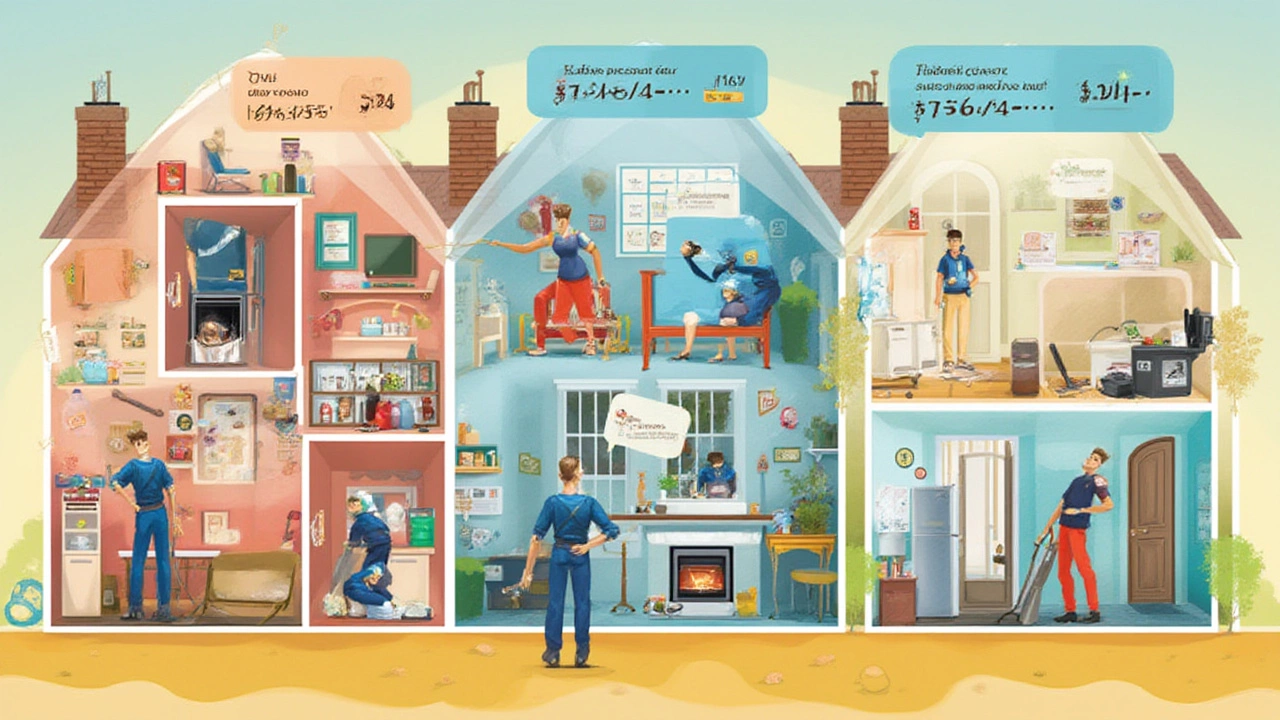When you see how much a professional deep cleaning actually costs, it can feel like a punch in the wallet. You’re not alone if your jaw has dropped after hearing a quote. A recent survey from The British Cleaning Council found the average deep clean of a three-bedroom semi in the UK hovers around £200–£350—sometimes even more in busy cities like London. But why is it so expensive? There’s a lot going on behind the scenes that most people never see. Stick with me—I’ll break it all down and spill the secrets that drive the cost up.
What Does Deep Cleaning Actually Mean?
Here’s the thing: a lot of people mix up regular cleaning and deep cleaning. Regular cleaning is the stuff you (or your cleaner) do every week. Vacuum, wipe down surfaces, take out the bins. Deep cleaning goes way, way further. It’s everything you don’t want to do—or honestly, never even think about. This means tackling built-up grime behind the oven, descaling taps and showerheads, scrubbing tile grout, and getting under heavy furniture that’s usually never moved. Professionals might even clean vents, windowsills, light fixtures, inside cabinets, skirting boards, and the tops of tall wardrobes. They’ll pull out your sofa and probably find enough Lego bits to start a shop—trust me, as a dad, I know.
We’re not just talking about visible dirt. Deep cleaning targets bacteria, allergens, pet dander, and embedded dust. That’s especially crucial if someone in your house has allergies or asthma. The difference after a deep cleaning isn’t just a shiny kitchen—it’s a genuinely healthier home.
Here are some things professionals do during deep cleans that most people skip:
- Steam-clean carpets and upholstery
- Wash walls and remove scuff marks
- Treat and polish delicate surfaces
- Disinfect knobs, handles, and switches
- Remove limescale from bathroom fixtures
- Clean behind large/awkward appliances
- Sanitise bins and inside cupboards
- Remove cobwebs in hard-to-reach spots
It’s not a quick once-over. It’s hours of hard graft, sometimes with industrial-grade cleaners and machines. Suddenly, that price tag makes a bit more sense, right?
The Real Breakdown of Deep Cleaning Costs
So, what are you actually paying for? It’s way more than just a few hours of scrubbing. Companies factor in a lot of things when pricing, and it’s not just about profit. Here’s a peek at what goes into that phone quote:
- Labour: Deep cleaning is time-heavy. It’s not a two-hour sweep; most jobs take a whole day, sometimes longer for big or extra-dirty properties. Most teams send at least two cleaners, often more if it’s a bigger house.
- Supplies: Those heavy-duty, professional-grade products don’t come cheap. Many companies use eco-friendly, hospital-grade disinfectants that are safer but even pricier than supermarket brands.
- Equipment: Think powerful carpet cleaners, steamers, rotary buffers, and vacuums you’d never fit in the boot of a car. These cost thousands and need regular maintenance.
- Employee costs: Cleaners have to be paid a living wage, especially in cities like Bristol, where minimum wage isn’t enough. Insurance, background checks, and uniforms add up.
- Overheads: Don’t forget transport, office costs, admin, and VAT. If the company is reputable, they’re insured, bonded, and have proper training.
Here’s how the cost can stack up for a typical 3-bed house deep clean in the UK:
| Item | Cost (£) |
|---|---|
| Labour (2 people for 6 hours) | 180 |
| Supplies & Materials | 25 |
| Equipment use & depreciation | 20 |
| Travel & administration | 15 |
| Insurance/Other overheads | 20 |
| Total | 260 |
You may find quotes above or below this, but that’s the sort of maths behind it. If you’re in a rural area without travel fees, maybe it’s less. In London or if things are really bad, definitely more. Remember: deep cleaning isn’t weekly housework. It’s a top-to-bottom overhaul.

Why DIY Deep Cleaning Often Costs More Than You Expect
Loads of people think, “I’ll save a fortune and do the deep clean myself.” That’s how I thought, too, before kids—and before realising how long it actually takes. On paper, all you need is motivation and a trip to B&Q, right? It’s not that simple. The clock starts as soon as you move the first chair. Scrubbing limescale, shifting the fridge, tackling carpets—suddenly, hours fly by. You might save on wages, but you’ll probably spend plenty on special products: carpet cleaner, limescale remover, wood polish, anti-bacterial sprays. Then there’s equipment. Professional machines make a difference; if your hoover’s from 2010 and you’re on your hands and knees, you’ll see why the pros charge what they do. If you want professional results, you might end up hiring or buying tools (steam cleaners can cost £20/day to rent—or way more to buy).
Factor in your own time. Could you earn more at work during those hours, or have a better day with the family? I’ve spent whole Saturdays and not finished half of what a pro team can smash out in six hours. DIY deep cleaning can end up nearly as expensive, once you add it all up, not to mention the time and effort. And if you miss spots? You’ll notice later—usually when guests are over or you’re trying to chill out and suddenly see the cobweb in the hallway you swore you got.
Is Deep Cleaning Ever Worth the Cost?
“Do I really need to pay for a deep clean?” It depends. If you rent, most landlords in the UK now expect an end-of-tenancy cleaning certificate just for you to get your deposit back. Skip it or do a poor job, and you could lose £500. The same goes for selling a house—clean, fresh homes get better offers. Allergies, mould, or a burst of spring hay fever? Deep cleaning zaps the hidden grime regular cleaning misses. There’s also the time factor: working parents (like me) sometimes just need the reset button pushed on the house.
If you use cleaners regularly, try doing a deep clean once or twice a year, then stick to a lighter maintenance schedule in between. You can even focus deep cleaning on high-traffic areas—the kitchen, bathroom, and entryway—to save a bit. Just be honest about what you’ll realistically do yourself. If you’re like most people, life gets busy. The deep clean keeps everything healthier and saner.
I’ve had friends in Bristol who skip the deep clean to save money—until their oven smokes or they have to scrub down the bathroom walls before a guest stays over. Suddenly, the price looks more reasonable. Plus, some companies now offer loyalty discounts or bundle deals if you book regular maintenance afterwards.

How to Get the Best Value on Deep Cleaning
If you’re ready to pay but want to avoid overpaying, here’s how to get the most bang for your buck. Don’t just book the first company you find on Google. Ask around—the best recommendations often come from neighbours or local Facebook groups. Get at least three quotes and ask exactly what’s included. Some firms charge extra for ovens, windows, or inside cupboards. Others bundle everything (and you get a genuine deep clean). Check if they’re insured and background-checked—especially if they’ll be inside your home for hours and around your stuff.
You might get a better rate booking during less busy times—weekdays or over the quieter seasons. If you’re not fussy about timing, mention it when booking. And if you can prep the space before they arrive—decluttering, emptying bins, moving small furniture—you could knock some time (and pounds) off the job. Always ask if there are any new-customer deals or loyalty programs. Many local Bristol cleaning teams offer a deduction if you book follow-ups, and some throw in extra services if you refer a mate.
- Be specific: List key pain points (bathrooms, carpets, windows), so your quote reflects the real job.
- Check reviews: See what other customers say, especially if they mention value, punctuality, and thoroughness.
- Ask about chemicals: If you have allergies, tell them in advance. Good companies have low-odour or green options.
- Don’t skip the walk-through: When they arrive, point out the dirtiest spots. Sometimes, showing them the chaos helps you get an honest opinion—and sometimes a reality check on the price!
Still on the fence? If you’re moving, renovating, or haven’t done a real deep clean in the past year, it’s probably worth it. You’ll see it and feel it. And next time the kids chase Jasper through the hall, you won’t flinch at what’s lurking under the sofa.
